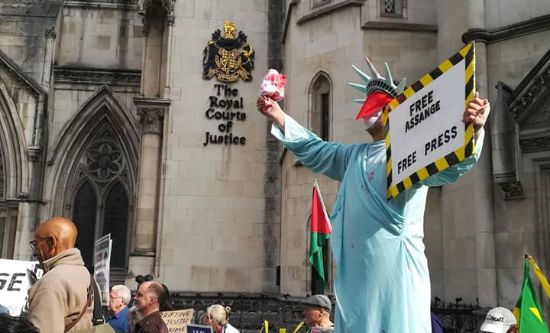
On 27-28 October, lawyers acting on behalf of the US government continued the state’s quest to extradite whistleblowing journalist Julian Assange, appealing to the High Court against an earlier ruling in January 2021 that Assange should not be extradited on account of the detriment this would cause to his mental health. The US state is not giving up, and is determined to punish Assange severely for his role in exposing its war-crimes. SEAMUS O’TUAIRISC reports.
On the first day of the hearing, James Lewis QC, representing the US, argued that Assange ‘does not currently have a mental health condition which precludes his extradition’ and that Vanessa Baraitser, the judge in the earlier case, had misjudged the evidence of his possible suicide risk when she blocked his extradition in January. The prosecution then attempted to undermine the testimony of psychiatrist Dr Michael Kopelman who evaluated Assange’s personal, medical and family history. During the extradition hearing in 2020, Kopelman testified that Assange is on the autism spectrum and has been diagnosed with clinical depression, which would increase his risk of suicide. He had observed that Assange was sleep deprived, had lost weight, had concealed a razor as a means of self-harm and had expressed ruminations on ways of killing himself.
This line of attack was not in the original grounds of appeal, but in August 2021, the US was granted the right to expand its grounds to include the claim that Baraitser had given too much weight to Kopelman’s testimony, and that Kopelman had misled the court by omitting to mention that Assange was in a relationship with Stella Morris, with whom he has two children. This argument is designed to undermine the ruling that Assange’s extradition would pose a serious risk of suicide and therefore infringes Section 9 of the Extradition Act 2003, which states that a judge must discharge a defendant if their mental or physical condition means that their extradition would be oppressive.
The introduction of new arguments in this way echoes events in the original extradition hearing, when the US state’s initial arguments were dismantled by Assange’s lawyers and the US reacted by filing a superseding indictment based on claims made by Icelandic hacker Sigurdur Thordarson that Assange instructed him to hack phones and find classified documents. Thordarson has since claimed that he only cooperated with the US authorities out of fear that he would be charged with hacking and was offered immunity from prosecution in exchange for his cooperation.
Lewis gave the High Court apparent assurances that if extradited, Assange would not be sent to ADX Florence, the infamous US maximum security prison where prisoners are kept in total isolation, nor would he be subject to any other form of solitary confinement. Lewis also said that the US would allow Assange to serve his sentence at an Australian prison. These claims are dubious, however, as there is no mechanism for any government, court or organisation outside the US to challenge the US government if it fails to honour these assurances, and the Australian authorities have given no indication that they would accept Assange as a prisoner.
On the second day of the hearing, Assange’s lead barrister Edward Fitzgerald QC maintained that Baraitser had properly weighed up the evidence that the oppressive prison conditions Assange would be subjected to would increase the risk of suicide. Fitzgerald drew parallels between Assange and the case of Lauri Love, a hacktivist who is also autistic and whose extradition to the US was overturned by the High Court in 2018 because it was ruled that this would increase the risk of suicide. Mark Summers QC then challenged the US’s assurances around the conditions of Assange’s detention. He highlighted how these assurances are unreliable and inadequate, were only made after Baraitser’s ruling, and cannot be taken in good faith given the vindictiveness of the US. He also referred to news reports of conversations with more than 30 former government officials who indicated that under the Trump administration the CIA had plotted to assassinate Assange while he was in the Ecuadorian embassy in London.
A date for the appeal judgment has not yet been confirmed but it is expected within weeks. Whatever the outcome, there is likely to be a further appeal to the Supreme Court. Meanwhile, Julian Assange continues to be held in HMP Belmarsh, where he has been since 2019, and where his health has seriously deteriorated. Ahead of the hearing, it was announced that Assange was too unwell to attend the hearing or even to listen via video link; however he did join by video-link halfway through the proceedings on the first day. He appeared thin and unwell, and left again one hour later.
Whilst Julian Assange’s physical and mental health continue to be of grave concern to his family and friends, the case concerns more than just the health of one man. When Baraitser ruled against Assange’s extradition in January, she did so specifically on the basis of the health risks, thus disregarding and dismissing all the political arguments put forward in the case. However, we must not forget that this case always has been and continues to be politically motivated and at root is an attempt by the US government, with the support of Britain, to suppress independent journalism and punish those who attempt to expose imperialism’s crimes.
Fight Racism! Fight Imperialism! No 285, December 2021/January 2022




